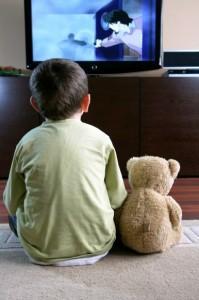A study coming out of New Zealand found that the more TV children watch before bedtime, the less sleep they get. The study appeared online in Pediatrics 2013.
 Children and teens that spent the most time in front of a screen were more likely to go to sleep later than those who were engaged in non-screen sedentary activities before bed.
Children and teens that spent the most time in front of a screen were more likely to go to sleep later than those who were engaged in non-screen sedentary activities before bed.
Sleep duration in younger people has declined rapidly over the past 100 years, researchers noted, adding that not enough sleep is associated with behavior and health issues.
To investigate associations between activities, the researchers used data from a nationally representative, cross-sectional survey of New Zealand children and teens, ages 5 to 18. Participants were interviewed in-person and then follow-up was done through telephone interviews between September 2008 and May 2009.
Baseline face-to-face interviews gathered information on participant characteristics and 1 to 2 days of data on use of pre-sleep time. The follow-up gathered 2 additional days of data. Younger children’s parents would assist with recalling activities when necessary.
Participants reported time of sleep onset, sedentary behavior, physical activity, and self-care during the 90 minutes before sleep by selecting from a list of roughly 250 activities. Activities were given energy costs and psychometric properties, and were recounted with time spent engaged in each activity.
Times of sleep onset were categorized as very early, early, late, and very late. Participants were grouped by ages 5 to 12 and 13 to 18.
A total of 2,017 survey participants were included in the current analysis. The mean age was 11.6, just over half were male (52.9%), and most were of New Zealand European ethnicity (71.4%).
Overall, younger participants went to bed earlier than older ones. The most common activities before bed were watching television while sitting (47.8%), dressing/undressing before bed (41.8%), and brushing one’s teeth (41.5%), and all were considered low-intensity activities (metabolic equivalents ranging from 1 to 2).
“In New Zealand, a maximum of 2-hours of screen time per day is recommended for young people,” the authors noted, adding that the roughly half hour of screen time before bed accounted for one quarter of a child’s daily recommended screen time.
Researchers also found that participants who reported later sleep onset also reported up to 13 more minutes of screen time before bed than those who went to bed earlier. Additionally, early sleep onset was associated with significantly less time in screen-based sedentary activity versus later sleep onset.

